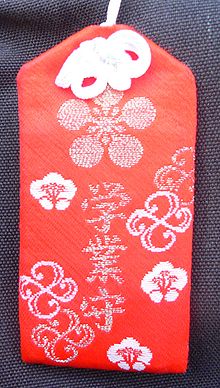- Omamori
-
Omamori (Japanese: 御守, omamori) are Japanese amulets dedicated to particular Shinto deities as well as Buddhist figures. The word mamori (守り) means protection, with omamori being the sonkeigo form of the word, "to protect.".
Contents
Design and function
The amulet covering is usually made of cloth and encloses papers or pieces of wood or paper with prayers written on them which are supposed to bring good luck to the bearer on particular occasions, tasks or ordeals. Omamori are also used to ward off bad luck and are often spotted on bags, hung on cellphone straps, in cars, etc. for safety in travel. Many omamori are specific in design to the location they were made.
They often describe on one side the specific area of luck or protection they are intended for and have the name of the shrine or temple they were bought at on the other. Generic omamori exist, but most of them cover a single area: health, love, or studies, to name only a few. It is said that omamori should never be opened or they lose their protective capacities. Amulets are replaced once a year to ward off bad luck from the previous year. Old amulets are usually returned to the shrine or temple so they can be disposed of properly.[1]
 Another study-dedicated omamori, Gakugyojoju, in a keychain.
Another study-dedicated omamori, Gakugyojoju, in a keychain.
 An omamori from a shrine in Kumamoto. This item claims to "grant protection" to the user. The logo above denotes a Jodo Shinshu temple.
An omamori from a shrine in Kumamoto. This item claims to "grant protection" to the user. The logo above denotes a Jodo Shinshu temple.
Modern commercial uses
There are modern commercial versions for these that are typically not spiritual in nature and are not issued by a shrine or temple. They do not confer protection or need to be replaced every year. It has become popular for stores in Japan to feature generic omamori with popular characters such as Mickey Mouse, Hello Kitty, Snoopy, Kewpie, etc.
Examples
Some popular omamori are:
- Kanai Anzen: For good health and help with illness.
- Kōtsū Anzen: Protection for drivers and travelers of all sorts.
- En-musubi: Available for singles and couples to ensure love and marriage.
- Anzan: Protection for pregnant women during term and to ensure a safe and easy delivery.
- Gakugyō Jōju: for students and scholars.
- Shōbai Hanjō: Success in business and matters of money.
See also
Notes
External links
Categories:
Wikimedia Foundation. 2010.


